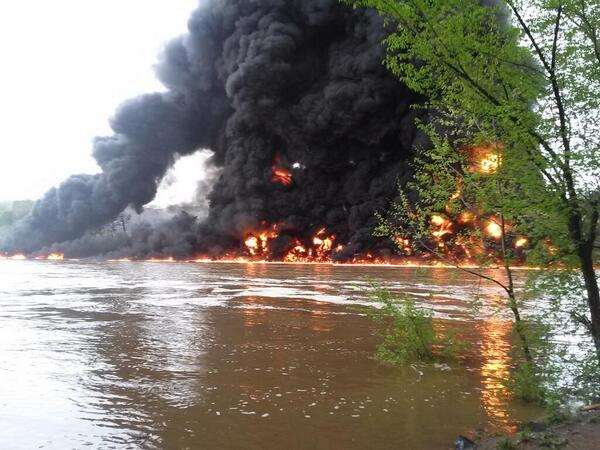The worst onshore oil spill in United States history was the Kalamazoo River tar sands pipeline spill in 2010 with estimates of one million gallons of oil spilled. In comparison, the oil-by-rail accident in Lac-Megantic, Quebec was 50% bigger.
With the oil-by-rail industry proposing large expansions to West Coast destinations, it is understandable that some local communities are worried about the risks of a spill causing major environmental damage and threatening human health.
While the fiery explosions get the most attention when it comes to oil train accidents, the trains also have resulted in some of the largest oil spills in North America. And that oil is usually ending up in waterways.
In Lac-Megantic, 1.5 million gallons of oil spilled with some of it ending up in the nearby lake and river. In Aliceville, Alabama it was 750,000 gallons that ended up in wetlands. In Mount Carbon, W.Va. it was approximately 400,000 gallons on the banks of the Kanawha River. In Gogama, Ontario ruptured rail tank cars ended up in the water. Just like in Lynchburg, Virginia. And the spill in Galenas, Illinois was noted to pose “imminent and substantial danger” to the Mississippi River.
People trained as first responders to marine oil spills are very clear that the speed of the response is critical for minimizing damage. On the website for the Marine Spill Response Corporation it clearly states, “During an oil spill, time is of the essence!”
Of course, the volatile nature of the Bakken crude oil means that the current recommended approach to dealing with a Bakken oil train that has derailed and is leaking and on fire is to evacuate everyone within a half-mile radius and then let the train burn — sometimes for days.
Meanwhile in January of 2014 the National Transportation Safety Board put out a safety recommendation about the current state of oil response planning for the rail industry that stated:
“oil spill response planning requirements for rail transportation of oil/petroleum products are practically nonexistent compared with other modes of transportation.”
Large oil spills resulting in dangerous fires and explosions that make quick response impossible — and yet response plans are still practically non-existent. It would seem like a recipe for disaster.
But there is a bit of hope on the horizon. The current Transportation bill approved by the House of Representatives includes requirements for actual spill response planning for oil-by-rail transportation.
Of course, since this involves the rail industry, the bill will allow the rail companies to keep the plans secret, so really there isn’t much hope at all.
This secrecy might not be as much of an issue if recent industry oil spill response plans hadn’t proven such a joke.
BP’s response plan for the Gulf of Mexico prior to the Deepwater Horizon disaster included advice on how to deal with walruses. And a link the company provided for “primary equipment providers for BP in the Gulf of Mexico Region [for] rapid deployment of spill response resources on a 24 hour, 7 days a week basis” was actually a link to a Japanese home shopping website.
It is no wonder the oil industry wants to keep its spill response plans secret, as they don’t hold up well to scrutiny. And apparently the government agencies responsible for reviewing them aren’t spending much time on the details.
Who Would Pay For a Worst-Case Oil-by-Rail Disaster? Not the Rail Industry
In another recent win for the rail companies, a court in Washington ruled that companies planning to build and expand oil-by-rail facilities “do not need to prove they have the financial resources to cover a worst-case scenario accident before receiving state permits.”
With this industry-friendly regulatory environment, it isn’t surprising that there is strong opposition to several new oil-by-rail facilities planned for the West Coast.
The Port of Grays Harbor in Washington is one planned location for facilities that could bring in up to fourteen unit trains of crude oil a week. The public comment period for that project is currently open and many community members are calling for a full environmental impact assessment for the projects. That’s something that wasn’t required for many existing oil-by-rail facilities on both the East and West coasts as they were approved without the public’s knowledge and regulators approved the projects without thoroughly reviewing potential environmental impacts.
The potential environmental damage of a catastrophic oil train accident exceeds the worst pipeline spill ever, and yet the oil-by-rail industry continues to expand without any response plans in place. In other words, business as usual.
In April, DeSmog reported on the testimony of Rep. Jackie Speier (D-CA) during a hearing on regulation of the pipeline and rail industries. She has fought for improved pipeline safety since 2010 when a pipeline explosion in her district killed eight people and burned down a neighborhood. In her testimony, she stated that “the system is fundamentally broken.”
And so the oil-by-rail industry will continue to expand with a broken regulatory system and non-existent spill response preparation. And the regulators have predicted that they expect an average of ten derailments per year for the next twenty years.
Odds are the Kalamazoo River oil spill won’t hold the record for largest spill for much longer.
Photo Credit: Erin Ferrell – ABC 13 News via Twitter
Subscribe to our newsletter
Stay up to date with DeSmog news and alerts







